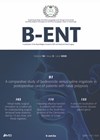
Journal Reviews
Olfactory disorders in COVID-19
This Turkish prospective longitudinal observational study evaluated olfactory disorders (OD) and recovery processes in patients with COVID-19 infection at three time points within the first month of diagnosis: time of diagnosis with positive PCR test; time of first negative PCR...
Biologicals for severe chronic rhinosinusitis with nasal polyps. Any use?
Recent advances and knowledge of inflammatory endotypes of chronic rhinosinusitis with nasal polyps (CRSwNP) led to introduction of biological agents such as monoclonal antibodies targeting IgE (omalizumab) and Interleukins (ILs) such as IL4R alpha (dupilumab) and IL5. The European Academy...
When should revision FESS leave you reaching for the script pad?
This very interesting work from the professorial team in London seeks to define a group of patients with CRSwNP who may benefit from early biological treatment since they are at risk of failure of surgical and conventional medical management. Approximately...
Remote consultations: bringing ENT in to the 21st century
The ongoing peaks and troughs of the COVID-19 pandemic have imposed unprecedented challenges on day-to-day healthcare provision that we all took as given across the globe prior to spring 2020! The pandemic has, in many ways, made us push boundaries...
Which factors affect the postoperative CSF leak following endoscopic skull base surgery?
Endoscopic skull base surgery is being increasingly performed worldwide for skull base tumours. Common indications include pituitary tumours, rathke cleft cysts, chordomas, craniopharyngiomas and olfactory neuroblastomas. The most common and important complication following endoscopic skull base surgery is postoperative CSF...
CRS vs. migraine: which is the culprit in most headaches?
‘Sinus headache’ is a common diagnosis according to patients and primary care physicians, but relatively infrequent in the eyes of otolaryngologists. This study examines 104 patients with a primary headache syndrome (PHS) and 130 patients with CRS, looking at SNOT-22...
How much does FESS improve the sense of smell?
We are all familiar with patients who undergo a seemingly successful FESS but, in spite of this, have persistent smell dysfunction postoperatively. This study compares a surgical group with a control group, measuring olfactory function pre and postoperatively using Sniffin...
COVID-19 in patients with chronic rhinosinusitis with polyps. Are they at risk?
COVID-19 entry factors are highly present in nasal epithelial cells. These factors include ACE2 and TMPRSS2. Their presence in patients with chronic rhinosinusitis with nasal polyps (CRSwNP) was not investigated before. Authors investigated expression of ACE2 and TMPRSS2 in two...
Does septoplasty improve smell?
This is a study from Barcelona on a very interesting topic: does septoplasty change sense of smell? The theory being that a deviated septum would prevent airflow to the olfactory region and once the anatomical obstruction has been relieved, that...
Can we predict how much benefit patients will get from ESS with a novel monoclonal antibody
Mepolizumab (Nucala) is a humanised IgG1 monoclonal antibody that acts as an IL-5 antagonist. It has been shown to be highly effective in treating severe asthma. It is hypothesised that it will be effective for patients with recalcitrant CRSwNP. This...
Review of pituitary tumour pathology
This is an excellent review article covering the pathology of pituitary adenomas (PA) as well as rare sellar lesions like lymphocytic hypophysitis that require aggressive treatment. The authors have preserved the 2017 World Health Organization (WHO) classification of PA and...
Simple preoperative tests predicting outcomes for ESS patients?
We are all familiar with patients suffering extensive nasal polyps who relapse all to soon after careful and thorough endoscopic sinus surgery (ESS). This paper looks to answer whether we can predict which patients will do well, and which less...















